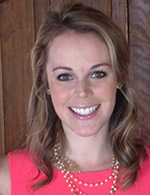
Meredith Ayres, a second-year student in the Graduate Program in Genetic Counseling, wants to help parents communicate with their children about having a life-shortening condition. Her research looks at Duchenne muscular dystrophy, a genetic condition that results in muscle degeneration. Children born with this condition are typically diagnosed at age five, and most live only to 40.
“Past data has shown that parents struggle with addressing this information to their children and wish there was a resource or guidance that could help them present these topics without taking away the joys of being a child,” said Ayres. “Some parents are open to talking to and preparing their children for the future ahead of them, while others want to protect their children, and some are terrified of bringing up these conversations.”
Ayres surveyed nearly 100 parents of children with this condition to gain knowledge on how they explain the stages of the disease. Sifting through her data, she found that parents have a hard time talking about subjects such as the eventual need for a wheelchair and ventilation, why they cannot participate in sports and end-of-life issues.
She hopes her data will be used to create a resource that could help parents of children with life-shortening conditions.
“Getting feedback from parents and people in the clinic such as social workers, we have found that they would like something to help them with these discussions,” she said. “There are so many genetic disorders that are life limiting and information that may be able to cross over into other specialties. Having a resource available might make those conversations more manageable.”
Ayres can foresee this research helping her as she pursues a career in genetic counseling and likes the multidisciplinary aspect to her project.
“My project ties together a lot of specialties, including neurology, social work, genetic counseling and psychology,” she said. “It shows all the people involved in the healthcare of a child. I might see a patient with this condition in a pediatric clinic and with my training I can explain the genetics behind the condition and be able to ask them how they are doing. If needed, I could refer them to a psychologist or social worker.”
While working on this project, Ayres recalls thinking that if she was parent, she would want to know how to prepare her child.
“I wouldn’t want my child to find out about their condition via the Internet, but at the same time I wouldn’t want to take away their joy as a child,” she said. “I would want some type of resource or guidance to help me through those difficult conversations.”






